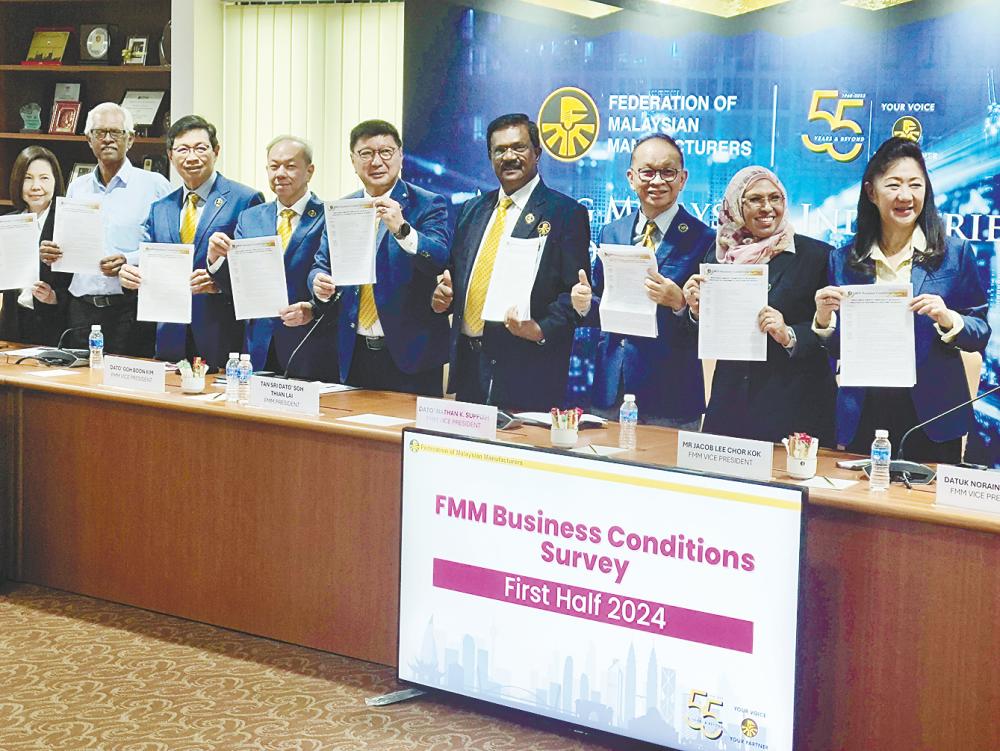KUALA LUMPUR: Malaysia’s manufacturing sector delivered growth in the first half of 2024 (H1’24) despite facing headwinds, inflationary pressure, volatile demand and global uncertainties.
Federation of Malaysian Manufacturers (FMM) president Tan Sri Soh Thian Lai said local manufacturers are optimistic and confident about growth in the second half of the year.
Local manufacturers are confident that Malaysia’s economic direction is on the right path and they have expressed confidence in the country’s foreign direct investment and domestic direct investment climate, he said at a media briefing today on the FMM Business Conditions Survey First-Half 2024.
The survey showed that Malaysian manufacturers have maintained production volumes, increased capacity utilisation, strategically managed costs and kept employment levels stable.
These outcomes suggest that local manufacturers are not merely responding to external pressures but are actively positioning themselves to shape their future in a competitive global landscape.
The survey also showed that manufacturers have a mixed outlook for revenue growth in 2024, showing optimism and caution due to economic challenges. Half of the respondents expect their revenue to grow, supported by a recovering global economy and strong domestic demand.
However, 21% think their revenue will stay the same, and 29% expect it to drop, likely due to rising operational costs, ongoing inflation, and global economic uncertainties. Notably, 9% of those surveyed anticipate significant revenue declines, especially in sectors reliant on exports or those already facing difficulties.
Looking ahead to the second half of 2024, FMM said the manufacturing sector is poised for continued growth, bolstered by a global economic recovery and supportive domestic policies. It said key metrics, including business activity and production volumes, indicate robust momentum, and manufacturers are gearing up to meet domestic and international rising demand.
However, the sector remains cognisant of increasing production costs and is taking a measured approach to workforce expansion.
On minimum wage, the FMM survey showed that a majority of respondents (57%) support an increase to RM1,600, reflecting a consensus that a modest rise is manageable and aligns with current economic conditions.
However, support for higher increases is limited, with only 14% and 13% favouring hikes to RM1,700 and RM1,800, respectively, due to concerns about rising operational costs and competitiveness.
The survey showed that the top five challenges to business operations and growth in H2’24 will be weak demand, rising input costs, ringgit depreciation, increasing competition, expansion of the customer base, and geopolitical risks.
Touching on the ringgit, Soh said the continued strengthening of the local currency would help manufacturers reduce operation costs and increase margin spread.
On how the ringgit appreciation would affect businesses, a significant portion of respondents (47%) view the ringgit appreciation positively, which could imply that these businesses benefit from stronger domestic purchasing power or reduced import costs.
Some 36% anticipate a negative impact, possibly due to reduced export competitiveness or other factors like higher ringgit costs for businesses relying on export sales. The 17% who foresee no impact are involved in less sensitive sectors to currency fluctuations.
Touching on government procurement, most respondents (88%) reported not supplying to the government, indicating barriers to entry or challenges in the procurement process. Only 12% are involved, suggesting government contracts are highly competitive or inaccessible.
The main obstacles identified are a need for more transparency (34%), too much paperwork (23%), complicated government procurement processes (20%), and competition from traders and foreign suppliers (20%).
To improve the system, 48% of the respondents suggest having a unified procurement policy with strict enforcement, 45% recommend creating a database of local manufacturers, 44% think using e-procurement platforms would help, and 31% support protecting whistleblowers.
“Almost all local manufacturers are not supplying to the government due to these challenges and the unavailability of a clear guideline and processes. FMM urges the government to expedite the implementation of the Government Procurement Act to aid local manufacturers in supplying the government,“ Soh said.
On Budget 2025, 32% of respondents prioritise reducing corporate tax rates, highlighting the importance of maintaining Malaysia’s competitiveness in attracting foreign investment.
Expanding tax incentives (16%) is also crucial for stimulating growth, especially in key sectors like technology, manufacturing, and green energy. It aligns with global trends to drive innovation and economic diversification.
Apart from that, 13% say ESG are increasingly important, encouraging sustainable practices and attracting ESG-focused investments.









